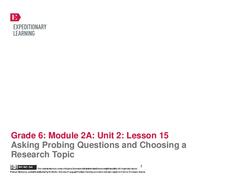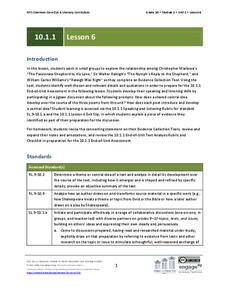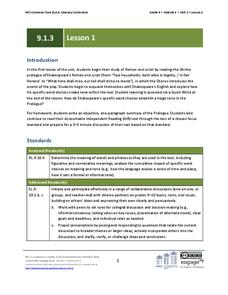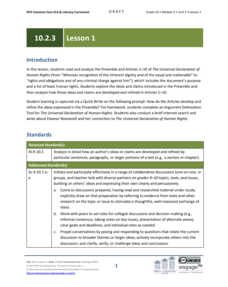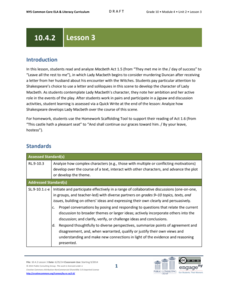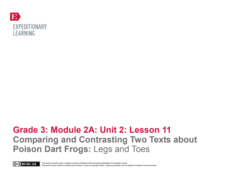EngageNY
Asking Probing Questions and Choosing a Research Topic
Begin the writing journey of an evidence-based essay detailing a rule to live by with various activities to familiarize learners with the topic and jump-start brainstorming. First, pupils take part in an in-depth review and discussion of...
Curated OER
Using Root Words as Clues
Delve deep into a Greek roots study with this graphic organizer. Scholars identify and define everyday words that are made from the Greek roots ast, bio, geo, and graph.
EngageNY
Grade 10 ELA Module 1: Unit 1, Lesson 6
Wrap up your literary analysis unit with a discussion activity as tenth graders prepare for an end-of-unit assessment. After they have read and annotated Christopher Marlowe's "The Passionate Shepard to His Love," Sir Walter Raleigh's...
EngageNY
Grade 10 ELA Module 1: Unit 3, Lesson 8
Prepare for a mid-unit assessment based on Amy Tan's The Joy Luck Club with a brainstorming and discussion lesson plan. Focused on two chapters from the novel ("Rules of the Game" and "Two Kinds"), the lesson plan guides tenth graders...
EngageNY
Grade 9 ELA Module 1: Unit 3, Lesson 1
Class members begin their study of Romeo and Juliet by examining the words Shakespeare chooses in the Prologue to Act I to create the tragic tone of his famous play about star-crossed lovers.
EngageNY
Grade 9 ELA Module 1: Unit 3, Lesson 13
Readers examine the conversation between Friar Laurence and Romeo in Act 3, scene 3 of Romeo and Juliet and consider how Shakespeare's word choices impact the development of Romeo's character.
EngageNY
Grade 9 ELA Module 1: Unit 3, Lesson 14
After watching the scene from Romeo + Juliet in which Juliet argues with her parents because she does not want to marry Paris, groups do a close reading of Act 4, scene 1, lines 44-88, examining the word choices in the conversation...
EngageNY
Grade 9 ELA Module 2: Unit 1, Lesson 4
True, you may be very, very dreadfully nervous, but a literary analysis unit will set your mind at ease. Learners study the narrator's point of view in Edgar Allan Poe's "The Tell-Tale Heart" and analyze how it contributes to a...
EngageNY
Grade 9 ELA Module 2: Unit 1, Lesson 6
It may not be 4 o'clock in the morning when you have ended these labors, but it's still time to work on textual analysis. Study the resolution of Edgar Allan Poe's "The Tell-Tale Heart" through the thematic lens of guilt and confession,...
EngageNY
Grade 9 ELA Module 2, Unit 2, Lesson 8
Prophecy and blindness often go hand in hand, as in Sophocles' Oedipus the King. Explore Oedipus' thoughts about prophecy, fate, and responsibility with an activity focused on the discussion between Creon and Oedipus regarding the murder...
EngageNY
Grade 9 ELA Module 3, Unit 1, Lesson 10
Finish your unit on Temple Grandin's Animals in Translation with a two-part written assessment. As ninth graders refer to their notes, annotations, and discussion guides from the first part of the unit, they prepare for a writing prompt...
EngageNY
Grade 9 ELA Module 3, Unit 3, Lesson 1
The opening exercise in this instructional unit introduces class members to the writing process they will follow to craft an informative, expository research paper that addresses their research question. To begin, writers are asked to...
EngageNY
Grade 9 ELA Module 4, Unit 1, Lesson 6
How do writers create a specific tone in their text? As class members continue their study of Sugar Changed the World, they focus on the words and phrases that Aronson and Budhos use to create that tone in their descriptions of arduous...
EngageNY
Grade 9 ELA Module 4, Unit 1, Lesson 8
In a close reading of "The Overseer" chapter from Sugar Changed the World, groups focus on the words Aronson and Budhos use to contrast the lifestyles of enslaved people and their enslavers. The whole class then engages in an...
EngageNY
Grade 9 ELA Module 4, Unit 1, Lesson 11
As part of a study of how writers structure their text so that readers understand events, class members do a close reading of "Is It Lawful to Make Slaves of Others Against Their Will?" a chapter in Aronson and Budhos' Sugar Changed the...
EngageNY
Grade 9 ELA Module 4, Unit 1, Lesson 19
Building on the previous discussion of the supplemental reading article "Where Sweatshops Are a Dream," class members use the provided Evaluating Argument and Evidence Tool to identify the claims and evidence Nicholas Kristof uses to...
EngageNY
Grade 9 ELA Module 4, Unit 1, Lesson 15
The Haitian Revolution takes center stage as class members analyze a passage from Sugar Changed the World and consider how the authors select, present, and organize events to show how the tensions between the concerns for freedom and...
EngageNY
Grade 9 ELA Module 4, Unit 1, Lesson 5
What did the Crusades and plantations do with the global sugar spread? As class members continue their study of Sugar Changed the World, they examine how Crusaders brought sugar to Western Europe and how cultivating sugar led to the...
Curated OER
Cell Phone Radiation
Should people be more worried about cell phone radiation? Scholars read extensive background information about the issue to prepare for a class discussion or debate. As they explore the website, they learn the main arguments for and...
EngageNY
Grade 10 ELA Module 2: Unit 3, Lesson 1
Scholars examine the Universal Declaration of Human Rights and analyze the ideas in the preamble. Readers define new vocabulary words, listen to a Masterful Reading, answer questions in pairs, participate in a jigsaw discussion, and...
EngageNY
Grade 10 ELA Module 4: Unit 2, Lesson 7
One sentence, so much meaning. Scholars analyze a quote from Act 2.3 of Shakespeare's Macbeth and explore the plot in a jigsaw discussion.
EngageNY
Grade 10 ELA Module 4: Unit 2, Lesson 3
How does Lady Macbeth's ambition help advance the plot of Shakespeare's Macbeth? Scholars explore the topic using discussion and a jigsaw activity. Next, they complete a quick write to analyze how Shakespeare develops Lady Macbeth's...
EngageNY
Grade 10 ELA Module 4: Unit 2, Lesson 2
What is the best way to determine the theme of a text? Pupils analyze how central ideas emerge in Shakespeare's tragedy Macbeth. They work in small groups and engage in a whole-class discussion to discuss the play's plot. Finally,...
EngageNY
Comparing and Contrasting Two Texts about Poison Dart Frogs: Legs and Toes
A lesson plan challenges scholars to compare and contrast two readings about Poison Dart Frogs. Information presented comes from different informational texts, followed by a discussion, and the completion of a Venn diagram. A one-page...
Other popular searches
- English Language Skills
- Pragmatic Language Skills
- Expressive Language Skills
- Oral Language Skills
- Language Skills Lesson Plans
- English Language Arts Skills
- Early Literacy Oral Language
- Functional Language Skills
- Social Language Skills
- Studying Latin Language
- Basic Language Skills
- Figurative Language Skills


